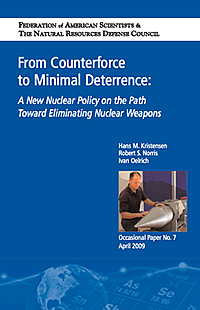Study Calls for New U.S. Nuclear Weapons Targeting Policy
 |
| Click on image for PDF-version of full report. |
By Hans M. Kristensen
The Federation of American Scientists and Natural Resources Defense Council today published a study that calls for fundamental changes in the way the United States military plans for using nuclear weapons.
The study From Counterforce to Minimal Deterrence: A New Nuclear Policy on the Path Toward Eliminating Nuclear Weapons recommends abandoning the decades-old “counterforce” doctrine and replacing it with a new and much less ambitious targeting policy the authors call Minimal Deterrence. [Update: see Washington Post – Report Urges Updating of Nuclear Weapons Policy]
Global Security Newswire reported last week that Department of Defense officials have concluded that significant reductions to the nuclear arsenal cannot be made unless President Barack Obama scales back the nation’s strategic war plan. The FAS/NRDC report presents a plan for how to do that.
The last time outdated nuclear guidance stood in the way of nuclear cuts was in 1997, when then President Clinton had to change President Reagan’s 17-year old guidance to enable U.S. Strategic Command (STRATCOM) to go to the START-III force level that the Bush administration subsequently adopted as the Moscow Treaty force level. The series of STRATCOM force structure studies examining lower force levels is described in The Matrix of Deterrence.
Resources: Full Report | US Nuclear Forces 2009 | United States Reaches Moscow Treaty Warhead Limit Early | Press Conference Video
The last remaining agreement limiting U.S. and Russian nuclear weapons has now expired. For the first time since 1972, there is no treaty-bound cap on strategic nuclear weapons.
The Pentagon’s new report provides additional context and useful perspectives on events in China that took place over the past year.
Successful NC3 modernization must do more than update hardware and software: it must integrate emerging technologies in ways that enhance resilience, ensure meaningful human control, and preserve strategic stability.
The FY2026 National Defense Authorization Act (NDAA) paints a picture of a Congress that is working to both protect and accelerate nuclear modernization programs while simultaneously lacking trust in the Pentagon and the Department of Energy to execute them.